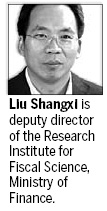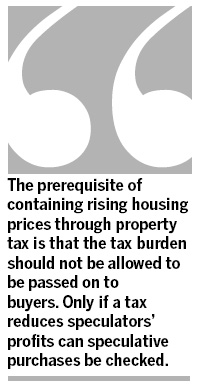Op-Ed Contributors
Debate: Is property tax fair?
(China Daily)
Updated: 2010-03-12 07:52
 |
Large Medium Small |
As home prices continue to climb, the government faces more pressure to stabilize the market. Two critics debate the relevance of the government's property tax.
Liu Shangxi: Small tax is impractical and a big mistake

Property tax, or real estate tax, has sparked a heated debate ever since it was introduced in 2003. In many countries, property tax comprises a small portion of government revenue. China first collected urban real estate tax in 1951 and housing property tax in 1986. These two taxes were merged into a housing property tax last year, targeting the housing property market. Property tax, despite remaining a small item of taxation, becomes a controversial issue when households are included as property taxpayers.
|
|||
But can property tax really stop housing prices from rising sharply? It can check speculative purchases of houses by reducing non-rigid demand in the real estate market. A new tax like this increases trade costs, including holding and sale costs, and dilutes speculators' impulse to invest in the real estate market.
But then all costs can be shifted to the final buyer. And property tax is no exception. Real speculators don't bother about a comparatively small tax that can be realized from buyers. Since the net price model prevails in China's housing sector, buyers will be made to bear all kinds of taxes, including income tax.
The prerequisite of containing rising housing prices through property tax is that the tax burden should not be allowed to be passed on to buyers. Only if a tax reduces speculators' profits can speculative purchases be checked. Otherwise, levying a new tax will not bring down housing prices. Instead, it will push them up further, especially if demand remains rigid.
Property tax is believed to raise real estate holding costs, too, and thus force developers to dump some unsold units. Housing prices can be checked if more houses are ready for sale. But it would be too optimistic to say housing prices would drop if the tax burden could be shifted to buyers. Moreover, developers rarely dispose of unsold houses, except in emergency cases.

As the chief tax, property tax serves as a stable source of income for local governments in many Western countries. But the system is not likely to work in China, because its local governments' functions are more inclusive than their Western counterparts. Economic development, public service and social stability, to name a few, are all responsibilities of local governments. The general state policies of the central government entail effective and flexible implementation by local governments.
This administrative paradigm makes it unrealistic to make property tax as the local governments' main source of income. What's more, it takes a family's cash income to pay the tax, which means the lower the people's income, the less the amount of property tax paid.
So how can governments in China's backward regions maintain a stable income through property tax? Property tax in the western part of the country should be classified as "community tax", because it's closely tied to residents' interests there. And tax rates should vary from community to community across the country.
But is it practical to introduce such a system in China and entitling local governments to collect this tax? Since most local governments are competing with each other to woo investors by offering them favorable tax rates, it is unlikely that they would impose property tax even if they were empowered to do so.
Property tax is a small item of taxation but the cost of collecting it can be considerably high. Real estate valuation, a fairly complicated undertaking, is first required to levy property tax. Under a settled tax rate, real estate valuation is an important process to determine how much tax each family should pay.
Who in that case would be a qualified valuator? Which standard should be followed for valuation? What steps should be taken for appealing? How can cheating be avoided? These uncertainties add up to social costs, intensifying social conflicts and problems.
The central government is trying to raise the proportion of people's income in the national revenue as part of the wealth distribution reform. So is making people pay income tax as well as property tax compatible with the aims of the reform? The tax move would cut the proportion of people's income in the national revenue further, but it is unlikely to harm domestic consumption.













